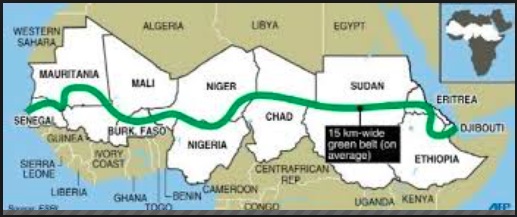
By Greg Odogwu
The draft bill for the establishment of a national agency for the Great Green Wall was recently approved by Nigeria’s government. The bill seeks to establish the National Agency for the Great Green Wall for the implementation of the provisions of the convention on the Great Green Wall programme in Nigeria, management of drought, desertification and afforestation control measures and related matters.
Granted, time is too short; but owing to its crucial import, if the National Assembly could give it accelerated hearing, President Goodluck Jonathan would surely be eager to sign the bill into law before leaving the office later this month.
Last week the bill passed second reading at the Senate. From the way the proceedings went, it was obvious that senators loved it and were falling over themselves to lend their voices for legislative approval. To say that the bill is vital is an understatement. In fact, appraising its importance can only make one wonder whether the outgoing administration and the about-to-go seventh National Assembly actually wanted to go by the epicurean philosophy which titillates the senses with the teaser, “Save the best for last!”
The manner with which the media reported the process and also that the lawmakers debated the bill vividly demonstrated the national importance of the bill, which even makes the “why now?” soliloquy more inevitable. One local media report couched its lead thus: “Senate yesterday set in motion the law that would bring an end to social conflict between Fulani herdsmen and farmers.”
Senator Ndoma-Egba, who led the debate, said the bill if passed into law would help safeguard the environment, ensure food security, reduce unemployment and poverty, protect citizens in the affected parts from vagaries of weather, reduce strife and criminality, ensure sustainable livelihood and avert a major catastrophe in the near future.
He said desertification affects an area of about 393, 168 square kilometre which is about 43% of the total land area of Nigeria and called on all the Senators to support the bill and passage into law.
In his remark before putting the bill to a voting which secured an unanimous “yea!” the Senate President David Mark said anything that affected 43% of the total land area of Nigeria was a serious problem and wondered why Nigeria which is one of the initiators of the Great Green Wall programme has not established the agency till now.
Indubitably, that a Great Green Wall agency has not been established in Nigeria yet is a sad statement on the government’s sense of priority. It was just last November that it managed to inaugurate the implementation of the Great Green Wall programme, which of course has virtually no power or structure without a legislative backup.
When President Jonathan cut the tape at Bachaka village marking the beginning of the establishment of a green wall or shelterbelt from Kebbi State to Borno State – a distance of 1,500 km and 15km wide – some Nigerian commentators said it stood as a redeeming signpost for a government that had scored low in its efforts in the fight against climate change.
However, it is obvious that without the establishment of a national agency to manage the project, the meagre mileage garnered by the outgoing government would be abysmally trivial at best and a blatant greenwash at worst.
My take is that both the Executive and the Legislative arms of the outgoing Nigerian government should do all in their powers to redeem their green image by ensuring the passage and signing into law of the NAGGW bill before May 29. Yes, it is possible!
In today’s world, green legacies are the vogue. Governments, politicians and corporate leaders all over the world struggle to leave lasting green footprints. Barrack Obama tells America he will leave the country greener than he met it; Chinese leaders have for the first time declared their green agenda into the coming decades; Gabon submitted its INDC as the government’s gesture to its people that it has become more global; South Africa’s Jacob Zuma boasts that he imprinted renewable energy policies into the country’s national psyche. Even Pope Francis is painting the religious space green. What green legacy can Nigeria’s outgoing government boast of?
There are four reasons why the NAGGW bill must be passed and signed now, and not left to encumber the incoming administration. Firstly, the initiative emanates from a regional idea, which actually originated from Nigeria. So it is a matter of national pride and diplomatic capital. The GGW is a national component of the Green Wall Sahara Africa Programme which came as a result of the African Union mandate during its meeting in Libya in 2006 to endorse the project for the 23 African countries affected by drought and desertification. Ever since the AU mandate, the Nigerian perspective has gone through several stages of planning but never really started.
Secondly, there is no gainsaying the fact that Northern Nigeria is under threat from desert encroachment.
Environmentalists all over the world have been aghast at the negligence of the nation’s northern edge where the desert is practically chasing out citizens from their homes. So, it was a near-national embarrassment watching smaller countries like Mauritania and Senegal take up the gauntlet to fight desert encroachment via the Green Wall Sahara concept while so-called Giant of Africa still dilly dallied, treating the clear and present danger with kid gloves and hollow oratory.
Thirdly, the GGW is a loaded concept with a very wide area of coverage, able to create jobs and fight climate change at the same time. The programme shall be implemented in 11 frontline states of Adamawa, Bauchi, Gombe, Kebbi, Sokoto, Zamfara, Katsina, Kano, Jigawa, Yobe and Borno; it will pass through 43 local government areas which will be covered to rehabilitate 225,000 hectares of land.
Let us look at a few of them. The GGW shall: make available economic trees and abundant fruits; create 5,000 jobs in each of the affected states, ranging from those engaged in tree planting, forest guards, sellers of fruits and vegetables, and watering; encourage private sector players to set up juice processing factories to absorb the raw materials from orchards; create modern grazing areas in the affected states; make available wood and other forestry resources; provide parks for tourist attractions; act as wind breakers against sand storms and other climate change induced weather upheavals; and act as carbon sink for the carbon-dioxide in the atmosphere, thereby checking ozone depletion and global warming.
To illustrate the palpable benefit, it can be observed that in recent years so-called Fulani herdsmen and their cattle are common sight in the urban areas, and in the Southern part of the nation where they used to be scarce; thereby having constant altercation with the local owners of the farms and lands where their cattle trudge in search of pasture.
This is simply because the northern pasture is gradually disappearing. However, with a robust implementation of GGW under a government agency, these herders will automatically go back to familiar grounds up north.
In fact, if the agency is established this month, it will help Nigeria gain in two strategic fronts. On the home front, it shall serve as a launch pad to rehabilitate the North East whose socio-economic life almost got wiped out by insurgency. On the international front, it will adorn Nigeria’s showcase at the coming UNFCCC COP 21 taking place in Paris this year. As other countries of the world come to parade their individual initiatives for fighting climate change, what better object of national pride than a brand new agency dedicated to tackling this global menace?










